MercoPress. South Atlantic News Agency
Tag: Alexandre Tombini
-
Friday, July 18th 2014 - 07:45 UTC
Brazil leaves basic interest rate unchanged at 11%; no surprises expected ahead of October election
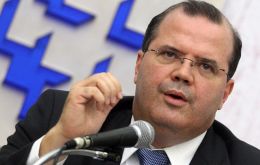
Brazil held interest rates unchanged for a second straight time this week but did not commit to keeping them stable for long as inflation remains high in Latin America's top economy. The Brazilian economy performance is anemic and next October president Dilma Rousseff is bidding for re-election.
-
Thursday, April 17th 2014 - 08:12 UTC
Brazil's chief banker forecasts inflation will come down in coming months

Food prices in Brazil have started to ease and should bring inflation down in coming months, central bank chief Alexandre Tombini said on Wednesday, reinforcing views that policymakers are ready to wrap up their year-long campaign of rate hikes. He reiterated that a significant part of the impact of past rate increases on inflation has yet to be felt.
-
Wednesday, April 9th 2014 - 06:48 UTC
Osborne launches with Mantega Brazil/UK 'economic and financial dialogue'
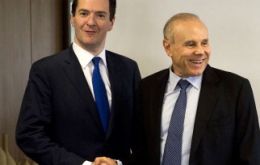
Finance minister Guido Mantega and Chancellor of the Exchequer George Osborne announced on Tuesday in Sao Paulo the launching of the Brazil/UK Economic and Financial Dialogue to strengthen bilateral trade and cooperation, and investment in infrastrucutre, according to a joint release.
-
Thursday, January 16th 2014 - 09:17 UTC
Brazil raised the benchmark rate to 10.5%: combating inflation the target
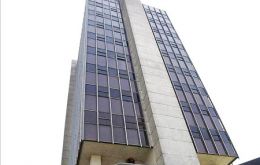
Brazil's central bank raised its benchmark interest rate on Wednesday to 10.50% from 10%, a larger-than-expected hike aimed at curbing inflation in spite of a weak economy. The decision by the bank's monetary policy committee, Copom, was unanimous.
-
Monday, December 16th 2013 - 09:30 UTC
Brazilian economy walking on “two crippled legs” argues Minister Mantega
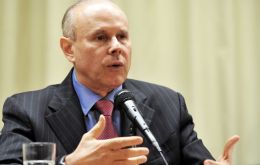
The Brazilian economy is walking with “two crippled legs” according to Finance Minister Guido Mantega who put the blame on the effects of the international slowdown with different rates of recovery, and the lack of credit to prop consumer spending.
-
Friday, December 6th 2013 - 07:05 UTC
Brazil's central bank expected to keep current pace of interest rate increases
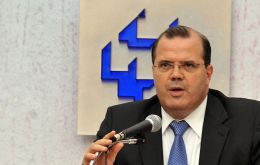
Brazil's central bank said its current pace of interest rate increases remains appropriate to rein in consumer prices, repeating language it used to justify previous half-percentage-point increases, according to the November 26/27 minutes released on Thursday.
-
Thursday, October 10th 2013 - 05:11 UTC
Brazil raises basic interest rate to 9.5% and leaves door open for further increases

Brazil Central bank raised interest rates for the fifth straight time on Wednesday and gave no indication of backing off its battle with high inflation. The benchmark Selic interest rate now stands at 9.5%, up fifty basic points from 9%.
-
Tuesday, September 24th 2013 - 08:07 UTC
Brazil will continue with the 60bn dollar currency intervention program: ‘it’s working adequately’

Brazil’s central bank chief Alexandre Tombini said on Monday policy makers will continue with their 60 billion dollars currency intervention plan, even after the Real rallied more than any other currency in the world as a consequence of the surprise announcement from the US Fed that for the moment it will not taper the bonds’ buying program to stimulate the US economy
-
Sunday, August 11th 2013 - 21:19 UTC
Brazil’s Rousseff approval rating bouncing back; support for economic team remains ‘soft’
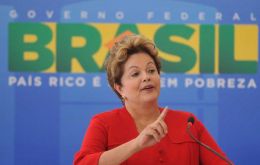
President Dilma Rousseff’s approval rating gained six percentage points after diving in the wake of massive protests in Brazil, a poll published on yesterday showed. The number of Brazilians who consider Rousseff’s administration “great” or “good” was 36%, up from an all-time low 30% in late June.
-
Thursday, July 11th 2013 - 17:02 UTC
Brazil ups basic rate to 8.5% to combat inflation; markets forecast 9.25%/10% by end of the year

Brazil’s central bank raised the benchmark interest rate a third consecutive time and anticipated that the tightening cycle may be extended through the rest of the year as policy makers fight inflation.
